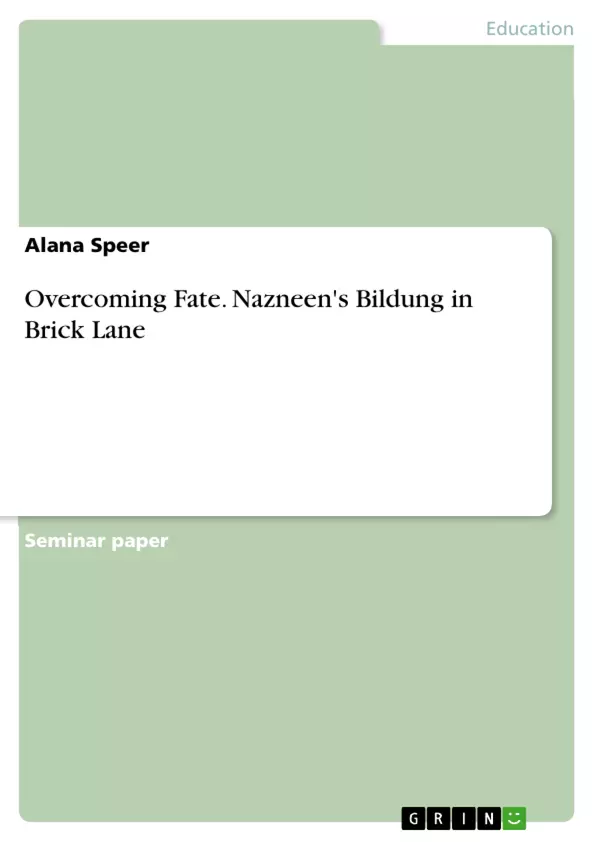This essay examines Nazneen's transformation in the course of Monica Ali's Brick Lane. It analyses how Nazneen changes into an independent woman by overcoming her belief that fate determines her life and focuses on how the people around her contribute to her transformation of character.
First I will select characteristics of the female Bildungsroman which are relevant for Brick Lane and Nazneen's development throughout the novel. I will pick up those characteristics in the course of the essay and apply them to Brick Lane. To understand where Nazneen's belief comes from I will take a closer look at the story of How She Was Left To Her Fate and therefore the origin of fate and the role of women in Islam. After that I will concentrate on different factors for Nazneen's transformation, how the people she interacts with contribute to her change, and take a closer look at crucial scenes from Brick Lane. Finally, I will take a look at how a transformed Nazneen stands up for herself and becomes her own person.
Inhaltsverzeichnis (Table of Contents)
- Overcoming Fate: Nazneen's Challenge
- Nazneen's Transformation into an Independent Woman in Brick Lane
- The Female Bildungsroman
- The Origin of Nazneen's Belief in Fate
- Factors Promoting Nazneen's Bildung in Brick Lane
- Nazneen Finding Her Own Voice
- Overcoming Fate: Nazneen's Journey of Self-Realization
Zielsetzung und Themenschwerpunkte (Objectives and Key Themes)
This essay examines Nazneen's transformation in Monica Ali's novel *Brick Lane*. It focuses on how Nazneen challenges the predetermined role of fate in her life and explores the factors contributing to her self-discovery and transformation into an independent woman.- The female Bildungsroman and its application to Nazneen's journey.
- The role of fate and its origins in Islamic beliefs.
- The impact of societal norms and expectations on Nazneen's identity.
- The influence of key relationships and interactions on Nazneen's personal development.
- Nazneen's journey of self-realization and her emergence as an independent woman.
Zusammenfassung der Kapitel (Chapter Summaries)
- Overcoming Fate: Nazneen's Challenge: This chapter introduces the essay's focus on Nazneen's transformation and the theme of overcoming predetermined fate. It highlights the use of the female Bildungsroman framework to analyze Nazneen's development.
- Nazneen's Transformation into an Independent Woman in Brick Lane: This section explores the concept of the female Bildungsroman and its application to Nazneen's journey. It discusses how Nazneen's quest for identity is intertwined with spatial and social growth.
- The Female Bildungsroman: This chapter delves into the characteristics of the female Bildungsroman, including the motives of travel, quest, and social integration. It analyzes how these elements are manifested in Nazneen's development in *Brick Lane*.
- The Origin of Nazneen's Belief in Fate: This chapter examines the origins of Nazneen's belief in fate, drawing from the story of *How She Was Left To Her Fate* and the role of fate in Islamic culture. It explores the impact of her mother's teachings and the societal expectations placed upon women.
- Factors Promoting Nazneen's Bildung in Brick Lane: This chapter analyzes the factors that contribute to Nazneen's transformation, highlighting the role of her environment, personal encounters, and her struggles with isolation and cultural barriers.
- Nazneen Finding Her Own Voice: This chapter delves into Nazneen's journey of self-discovery and her struggle to break free from societal constraints. It explores her efforts to assert her independence and find her own voice.
Schlüsselwörter (Keywords)
The key themes and concepts explored in this essay revolve around the female Bildungsroman, fate versus free will, gender roles in Islamic society, cultural adaptation, and self-realization. The analysis focuses on Nazneen's journey of transformation, highlighting her struggles with isolation, her encounters with societal expectations, and her ultimately empowering quest for identity and self-expression.Frequently Asked Questions
How does Nazneen transform in the novel "Brick Lane"?
Nazneen evolves from a woman who believes her life is entirely determined by fate into an independent person who finds her own voice and takes control of her destiny.
What is a female Bildungsroman?
A female Bildungsroman is a literary genre that focuses on the psychological and social development of a female protagonist, often involving a quest for identity and social integration.
Where does Nazneen's belief in fate come from?
Her belief is rooted in her mother's teachings and the story of "How She Was Left To Her Fate," reflecting traditional cultural and religious expectations.
What factors promote Nazneen's "Bildung" in the story?
Key factors include her move to London, her interactions with diverse characters, and the challenges of cultural adaptation and isolation she faces in Brick Lane.
What are the main themes explored in this essay?
The essay explores themes of fate versus free will, gender roles in Islamic society, cultural adaptation, and the journey of self-realization.
- Citar trabajo
- Alana Speer (Autor), 2013, Overcoming Fate. Nazneen's Bildung in Brick Lane, Múnich, GRIN Verlag, https://www.grin.com/document/281196



